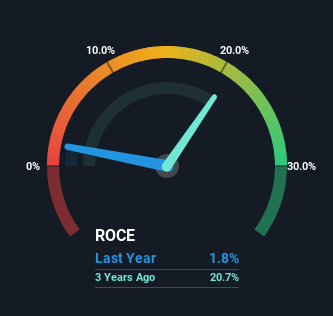- India
- /
- Basic Materials
- /
- NSEI:DECCANCE
Returns On Capital At Deccan Cements (NSE:DECCANCE) Paint A Concerning Picture
To find a multi-bagger stock, what are the underlying trends we should look for in a business? Typically, we'll want to notice a trend of growing return on capital employed (ROCE) and alongside that, an expanding base of capital employed. This shows us that it's a compounding machine, able to continually reinvest its earnings back into the business and generate higher returns. In light of that, when we looked at Deccan Cements (NSE:DECCANCE) and its ROCE trend, we weren't exactly thrilled.
Return On Capital Employed (ROCE): What Is It?
If you haven't worked with ROCE before, it measures the 'return' (pre-tax profit) a company generates from capital employed in its business. Analysts use this formula to calculate it for Deccan Cements:
Return on Capital Employed = Earnings Before Interest and Tax (EBIT) ÷ (Total Assets - Current Liabilities)
0.018 = ₹224m ÷ (₹15b - ₹3.1b) (Based on the trailing twelve months to December 2024).
Thus, Deccan Cements has an ROCE of 1.8%. Ultimately, that's a low return and it under-performs the Basic Materials industry average of 6.9%.
See our latest analysis for Deccan Cements

While the past is not representative of the future, it can be helpful to know how a company has performed historically, which is why we have this chart above. If you're interested in investigating Deccan Cements' past further, check out this free graph covering Deccan Cements' past earnings, revenue and cash flow.
What Does the ROCE Trend For Deccan Cements Tell Us?
In terms of Deccan Cements' historical ROCE movements, the trend isn't fantastic. Over the last five years, returns on capital have decreased to 1.8% from 14% five years ago. Given the business is employing more capital while revenue has slipped, this is a bit concerning. This could mean that the business is losing its competitive advantage or market share, because while more money is being put into ventures, it's actually producing a lower return - "less bang for their buck" per se.
Our Take On Deccan Cements' ROCE
We're a bit apprehensive about Deccan Cements because despite more capital being deployed in the business, returns on that capital and sales have both fallen. Since the stock has skyrocketed 187% over the last five years, it looks like investors have high expectations of the stock. In any case, the current underlying trends don't bode well for long term performance so unless they reverse, we'd start looking elsewhere.
One final note, you should learn about the 5 warning signs we've spotted with Deccan Cements (including 2 which are a bit concerning) .
If you want to search for solid companies with great earnings, check out this free list of companies with good balance sheets and impressive returns on equity.
New: Manage All Your Stock Portfolios in One Place
We've created the ultimate portfolio companion for stock investors, and it's free.
• Connect an unlimited number of Portfolios and see your total in one currency
• Be alerted to new Warning Signs or Risks via email or mobile
• Track the Fair Value of your stocks
Have feedback on this article? Concerned about the content? Get in touch with us directly. Alternatively, email editorial-team (at) simplywallst.com.
This article by Simply Wall St is general in nature. We provide commentary based on historical data and analyst forecasts only using an unbiased methodology and our articles are not intended to be financial advice. It does not constitute a recommendation to buy or sell any stock, and does not take account of your objectives, or your financial situation. We aim to bring you long-term focused analysis driven by fundamental data. Note that our analysis may not factor in the latest price-sensitive company announcements or qualitative material. Simply Wall St has no position in any stocks mentioned.
About NSEI:DECCANCE
Questionable track record with very low risk.
Similar Companies
Market Insights
Community Narratives



